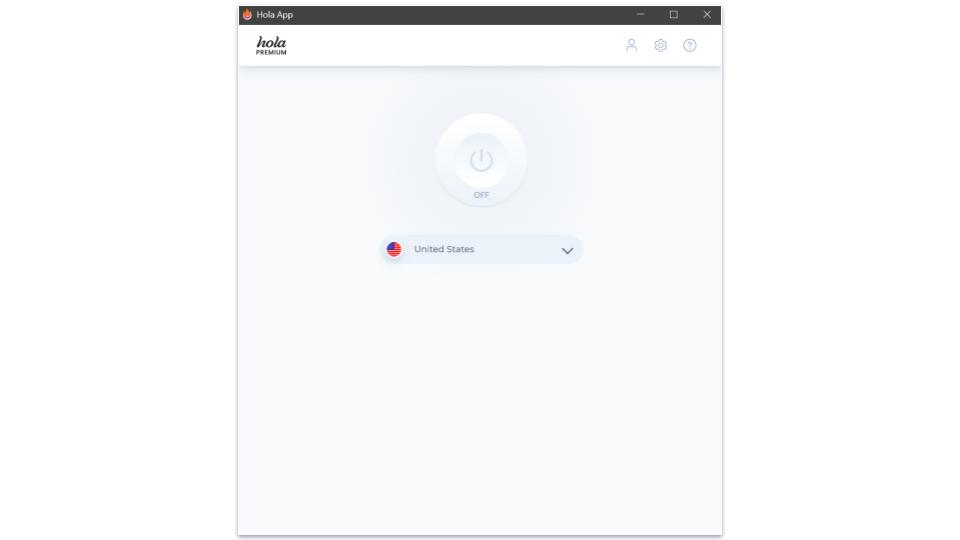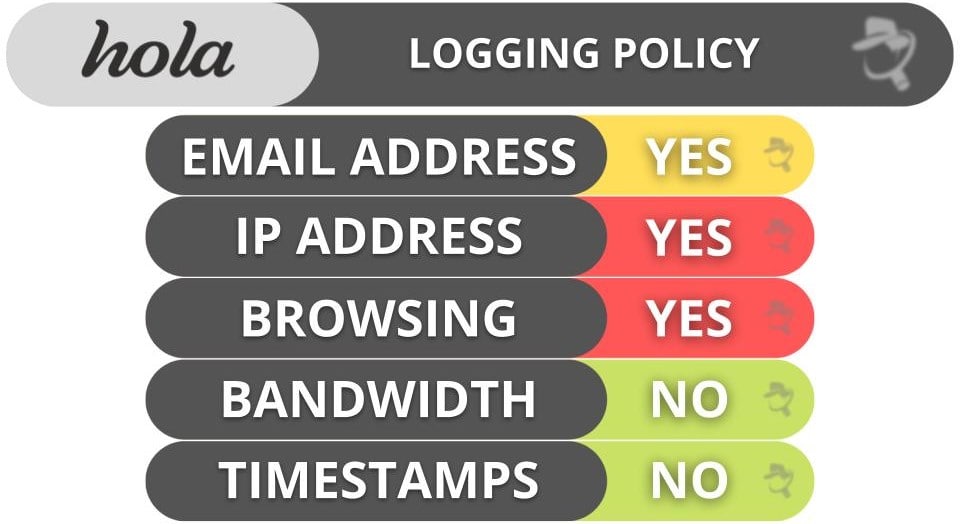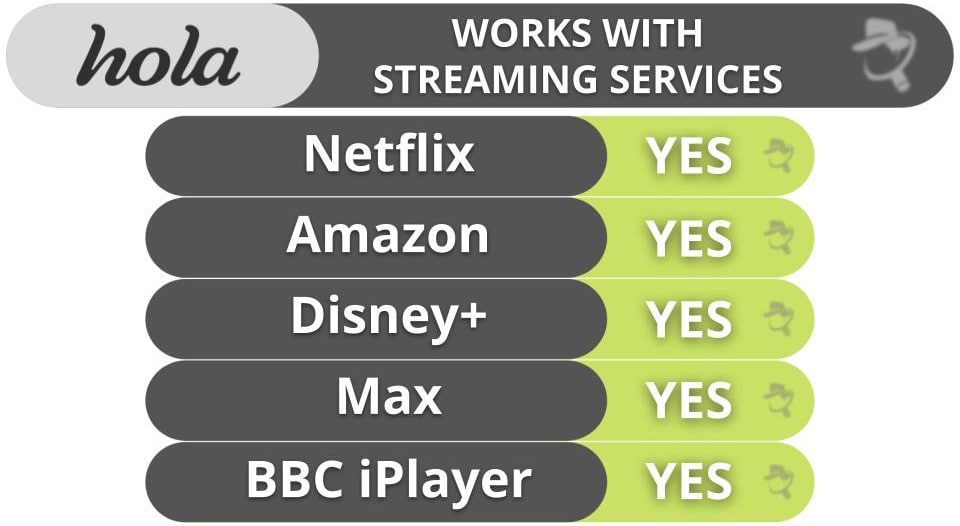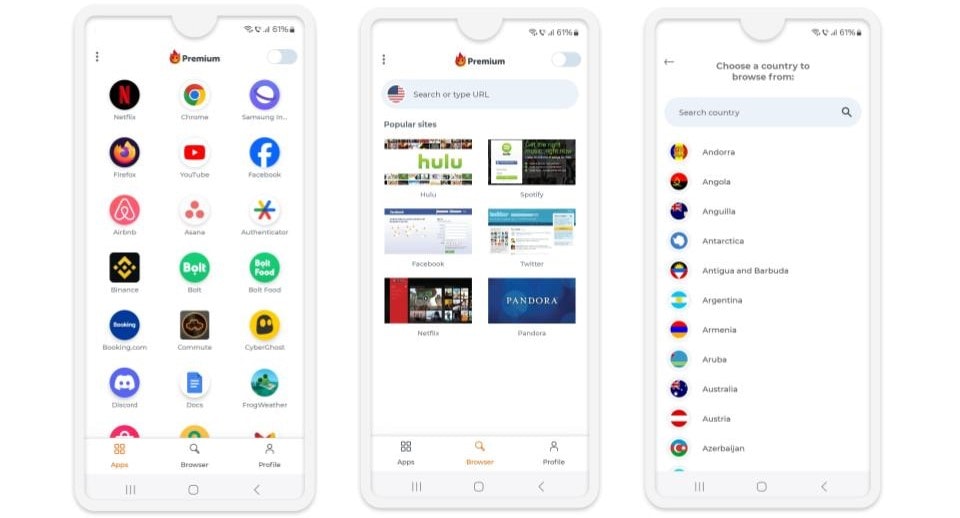Hola VPN Review: Quick Expert Summary
IMPORTANT: Hola is a terrible VPN service. Its free plan on desktop forces users to utilize a peer-to-peer server network that compromises their privacy. What’s more, Hola’s paid version also logs and shares user data, has slow speeds on distant servers, lacks good customer support, and comes with many other disturbing issues. There are tons of better options out there in 2025, like ExpressVPN.
Hola is good for streaming, but that’s about it. The provider is compatible with tons of popular streaming platforms, such as Netflix, BBC iPlayer, and Disney+. In addition, it also provides access to a smart DNS.
The main thing I hate is how bad Hola is for privacy. While it has 256-bit AES encryption, a kill switch, and even perfect forward secrecy, it lacks a no-logs policy — so the VPN logs your IP address and browsing traffic (plus, Hola says it might share that data with third parties). What’s more, Hola’s desktop apps use a peer-to-peer VPN server network. I have an issue with that because it means other Hola users use your IP address to surf the web, which can compromise your privacy.
What’s more, Hola has plenty of other drawbacks. First, it doesn’t allow torrenting on any of its servers (even if it did, I still wouldn’t recommend it for torrenting due to its privacy issues). Also, the VPN has pretty slow speeds on distant servers. What’s more, the provider’s Android app is inconvenient to install and doesn’t protect your device’s entire web traffic. Finally, most of its paid plans are too expensive for what they offer, and its email support is basically non-existent.
Hola has a free plan with 2 versions and a few paid plans. It also has a 14-day money-back guarantee, but you’re only eligible for it if you don’t use the paid version at all during those 14 days (I have never seen a VPN refund policy that works this way). You’re better off avoiding this VPN and getting a premium competitor instead, like ExpressVPN.
| 🏅 Overall Rank | #70 out of 82 VPNs |
| 🌍 Number of Servers | Unknown |
| 📱 Number of Devices | 10 |
| 💸 Starting Price | $2.99 / month |
| 🎁 Free Plan | ✅ |
| 💰 Money-Back Guarantee | 14 Days |
Hola Full Review — Avoid This VPN (Terrible Privacy, Slow Speeds & Unresponsive Support)

I spent the last couple of weeks testing Hola, trying to see how it compares to the other top VPNs on the market. Overall, the VPN is good for streaming, but it all goes downhill from there — its free plan is awful, and its paid version isn’t good, either.
I really don’t like how its free plan has 2 versions — one for desktop users, and one for mobile and browser extension users. On mobile and via the browser extensions, the free plan comes with annoying daily time limits (with random amounts of time for each user). On desktop, the free plan forces you to use a peer-to-peer server network that can compromise your privacy. The paid version has tons of drawbacks — it doesn’t come with a no-logs policy, you have to deal with slow speeds on distant servers, and you don’t get responsive email support.
Bottom line — just avoid Hola at all costs. You’re better off with a top VPN like ExpressVPN, which protects your privacy, has super-fast speeds, works with 100+ streaming sites, and provides very responsive and friendly 24/7 support.
Hola Plans & Pricing — Free Plan Not That Good & Paid Plans Are Pricey
Hola has a free plan and paid monthly and yearly plans. The free plan only allows 1 connection, while the paid plans allow up to 10 connections (this is on the upper end of the industry average of 5–10 connections). If you want to use the VPN on more devices, I recommend trying Private Internet Access instead — it allows unlimited connections, and it also provides better value than Hola.
The provider’s free plan has 2 versions — one for desktop app users, and one for mobile app and browser extension users.
On desktop, the free version lets you use all of the VPN’s features and servers, and it supports streaming — but I still can’t recommend it for privacy reasons since it forces you to use the provider’s peer-to-peer server network.
On mobile and via the browser extensions, the free plan provides access to all features, supports streaming, and it doesn’t force you to use the peer-to-peer system (you use standard VPN servers). However, you have to deal with daily time limits. Unfortunately, the time period is random for each user, so I can’t provide you with exact numbers.
If you’re looking for a free VPN, Proton VPN is a much better pick — it’s the best free VPN on the market, as its free plan allows unlimited data, provides fast speeds, and comes with high-end security and privacy features. Plus, the vendor’s free plan is very straightforward, as it only has one version. What’s more, the free plan doesn’t have time limits, and other Proton VPN users don’t get access to your IP and system resources (and Proton VPN also doesn’t collect your IP address).
Hola’s paid plans start at $2.99 / month, which is pretty affordable. That said, you need to commit to a 3-year subscription to get the biggest savings — and Hola’s other plans are pretty pricey.
Hola accepts credit/debit cards, PayPal, and Google Pay. It backs its paid plans with a 14-day money-back guarantee. However, I don’t like how you can only get a refund if you haven’t used the premium version at all during those 14 days. Most top competitors have longer refund policies (usually 30 days) that don’t force you to meet any requirements to get your money back.
Overall, Hola comes with a free plan, but it’s not that good (it puts your privacy at risk on desktop, and it has daily time limits on mobile). Also, some of its paid plans are pretty expensive, and there’s a 14-day refund — but you’re only eligible if you don’t use the paid version at all during that period.
Hola Features — Lacking Vital Privacy Tools & Some Features Are Inconvenient to Use
Hola comes with these industry-standard security features:
- Multiple encryption options. Hola allows you to choose between different AES encryption key sizes — 128-bit AES, 192-bit AES, and 256-bit AES. I like 256-bit AES the most since it’s the same type of encryption that military institutions and banks use, but the other encryption options are secure too.
- Kill switch. This security feature disables your internet access if your VPN connection drops to prevent traffic leaks. Hola also has an app-based kill switch, which lets you choose which apps are shut down if the VPN disconnects.
However, Hola doesn’t come with a no-logs policy. This means the provider collects your IP address and web browsing traffic, which is terrible for your privacy — this basically defeats the purpose of using a VPN to begin with. All of the top VPNs on the market have a strict no-logs policy.
Hola says it uses the IKEv2/IPSec protocol, which is secure and fast. That said, it also says that its desktop apps might also use the L2TP/IPSec or PPTP protocols if the VPN isn’t able to connect to a specific website — L2TP/IPSec isn’t as good as IKEv2/IPSec but it’s still safe. I’m concerned about PPTP, as this protocol’s encryption is extremely weak. To be honest, I wish Hola would just use WireGuard, which is very secure and fast and offered by most top VPNs.
The provider doesn’t specify what type of leak protection it provides — I sent Hola several emails about this, but its reps never got back to me. I ran leak tests on servers in 10+ countries, and I never experienced any DNS, IPv6, or WebRTC leaks.
Hola also uses perfect forward secrecy to protect your data. Perfect forward secrecy is an advanced security feature that changes the encryption key for each VPN session — this way, cybercriminals can’t try to use past or future session keys to compromise your VPN traffic.
Hole also has the following additional features:
- Split-tunneling. This feature normally lets you pick which apps or sites use the VPN, and which ones don’t. However, Hola’s split-tunneling is enabled by default — by that I mean you need to first pick an app or site to use before Hola connects to a server. For example, if I want to connect to a US server, I first need to pick an app or site that Hola will use through the US server. This is pretty inconvenient, and I think you get better split-tunneling with a top competitor like Private Internet Access (its split-tunneling feature is optional).
- Smart DNS. This feature lets you use Hola on devices that don’t natively support VPN apps, such as gaming consoles or certain smart TV models. To use the smart DNS, you need to perform a manual setup — but it’s pretty simple, and it doesn’t take more than 6–8 minutes.
Hola Privacy & Security — Just Awful (Collects & Shares Your Data)
Hola VPN is horrible for privacy. That’s because it collects your IP address (this can reveal your location) and web traffic, such as which websites you access and how much time you spend on them. What’s more, Hola’s privacy policy says the provider will share user data with third parties if required by the law — plus, it also says that the provider will disclose user data to affiliated companies.
I find this unacceptable, as pretty much all of the top VPNs on the market have strict no-logs policies that don’t record your IP address and browsing history. Some of them (like ExpressVPN and Private Internet Access) have even had their no-logs policies independently audited.

Also, I don’t like how Hola’s desktop apps use a peer-to-peer system. This basically means you use other Hola users’ IP addresses and system resources to browse the web, and they use your device’s IP address and system resources to do the same. This is terrible for your privacy, as a malicious user could use your IP to engage in criminal activities, which could get you in legal trouble. The only way to not share your IP and system resources with other Hola users is to get the paid version.
Hola is headquartered in Israel, which is outside the jurisdiction of the 5/9/14 Eyes Alliances (a group of countries that share surveillance data with each other). But I don’t find much comfort in that since the provider logs your personal data.
Overall, Hola can’t protect your privacy since it lacks a no-logs policy (it records your IP address and all of the websites you visit).
Hola Speed & Performance — Slow on Distant Servers, Decent on Local Ones
I ran speed tests in all 42 countries where Hola has servers to determine my average VPN speeds.
I started with a speed test of my local internet connection (without being connected to the VPN) to determine my baseline speeds. After that, I tested a local server in Romania. These are my speeds:

Next, I tested a distant server in the US — these are my results:

When I tested a local server, I experienced a noticeable drop in speeds. It wasn’t that huge, but I still had to wait around 3 seconds for websites to load — plus, HD videos on YouTube took around 4–5 seconds to load and there was minor buffering at the start of the videos.
And when I tried a distant server in the US, the slowdown was bigger. Most websites I visited took 5 seconds to load, HD videos loaded in around 7 seconds, and I experienced noticeable buffering and frequent quality drops while watching them.
Overall, Hola VPN maintains good speeds on nearby servers, but suffers noticeable slowdowns on distant servers. There are honestly much faster VPNs out there in 2025.
Hola Servers & IP Addresses — Confusing (& No P2P Support)
Hola has 2 different server networks — one that consists of peer-to-peer servers, and one that consists of regular VPN servers. The peer-to-peer network has servers in 42 countries, while the regular VPN server network has servers in 218 countries. The provider doesn’t disclose its total number of servers.
The regular server network is obviously superior since it has locations in pretty much every country around the world. That said, I find it annoying that it’s only available via its mobile apps and browser extensions — it’d be much more convenient if I could also access these servers on the desktop apps.
I’m honestly much happier with ExpressVPN’s server network — the provider has servers in 105 countries, and you can use those servers on each of the provider’s apps and browser extensions.
Also, Hola doesn’t come with any P2P servers (it blocks torrenting on all of its servers). If you want to use a VPN to download torrents, try Private Internet Access instead since it supports P2P traffic on all of its servers.
The only redeeming quality is that you can configure the desktop apps to display the server load — this metric represents how many active users are connected to a VPN server. By choosing servers with low load, you’re more likely to get faster speeds.
Overall, Hola’s server network is pretty confusing — it has 2 types of networks that can be accessed via different apps. What’s more, the VPN doesn’t support torrenting on any of its servers.
Hola Streaming & Torrenting — Good for Streaming, but There’s No Torrenting Support
Hola is very good for streaming, as it’s compatible with many popular streaming platforms such as Netflix, Disney+, BBC iPlayer, and Max.

But the VPN doesn’t have torrenting support — I tried downloading a few legal torrents while connected to Hola, and my downloads always stalled. But even if it did support P2P traffic, I still wouldn’t recommend using it since it lacks a no-logs policy. Instead, I suggest getting ExpressVPN since it allows torrenting on servers in 105 countries, it provides high-end privacy and security, and it maintains the fastest P2P speeds on the market.
Overall, Hola is good for streaming and terrible for torrenting. It works with all top streaming sites, but it doesn’t allow P2P traffic on its servers.
Hola Ease of Use: Mobile & Desktop Apps — Intuitive, but Android Installation Is a Pain

Hola has apps for several platforms, including Android, iOS, Windows, macOS, Fire TV, Apple TV, and LG TVs. It also has browser extensions for Chrome, Opera, and Edge, and it supports manual router configurations. If you want a VPN that you can also use on Linux and Android TV, try ExpressVPN.
I installed Hola’s Android app on my Samsung smartphone. I wasn’t very happy with the installation process, as the app isn’t available on the Play Store. Instead, you need to install it from your device’s app store (App Gallery on Huawei devices, and Galaxy Store on Samsung phones). The app is user-friendly, but I don’t like how the VPN doesn’t secure my device’s entire traffic — instead of directly connecting to a server, I have to choose a specific app or site to use the VPN server with.
I also tried out Hola’s desktop app on my Windows 10 PC, and it works pretty well. The interface is intuitive, and there are helpful explanations for most settings. But I think it’s a shame that the app is missing a quick-connect feature that automatically connects you to the fastest server for your location.
Overall, Hola has apps for most platforms, and both its mobile and desktop apps are intuitive — but I don’t like how inconvenient it is to install the Android app (plus, it doesn’t secure your device’s entire web traffic).
Hola Customer Support — Decent Support Library (But Unresponsive Email Service)

I’m not very happy with Hola’s customer support. While it has a lot of helpful support articles, it lacks live chat support and its email support is non-responsive.
Its support library has a lot of useful frequently asked questions (FAQs) and troubleshooting guides. I only have an issue with its tutorials — only a few of them offer step-by-step instructions and screenshots. Most tutorials (like the ones for the iOS and Android apps) are extremely basic and vague. And the provider doesn’t even have a tutorial for its macOS app. Clicking on the macOS tutorial just downloads the macOS app installer.
I also tested Hola’s email support over the course of a week — sadly, I never received a response to my questions.
To be honest, you get significantly better customer support with other top vendors — ExpressVPN, for example, has 24/7 live chat, very responsive email support, and a really in-depth support guide (that has detailed setup guides for all platforms).
Overall, Hola’s customer support isn’t impressive — while most of its support library is pretty good, most of its tutorials are not helpful. Plus, its email support is non-responsive.
Is Hola VPN Safe?
No, Hola isn’t good for securing your online privacy — it has military-grade encryption, a kill switch, and even perfect forward secrecy, but it’s missing a no-logs policy. What’s more, the VPN’s free plan forces desktop users to be part of a peer-to-peer server network, which puts their privacy at risk.
What’s more, Hola has tons of other issues — it has slow speeds on distant servers, it doesn’t have P2P support (though I wouldn’t recommend using it for torrenting even if it did support it), and its Android app is annoying to install and it doesn’t secure your device’s entire internet traffic. Plus, Hola’s customer support isn’t very good, and most of its plans are overpriced.
Hola has a free plan with 2 versions and a few paid plans. It also comes with a 14-day refund, but you can only get your money back if you don’t use the paid version at all during those 14 days.
To be completely honest, there are tons of better VPNs out there — any of the vendors on our list of the best VPNs in 2025 provides significantly better value.
Frequently Asked Questions
Is Hola VPN free?
Yes, Hola has a free plan, but it comes with 2 versions — one for desktop users, and one for the provider’s mobile apps and browser extensions. On desktop, the free plan forces you to use a peer-to-peer system that’s pretty bad for your privacy (other users access the web via your IP). And via the mobile apps and browser extensions, the free plan enforces daily time limits. And both free versions limit you to 1 connection.
If you need a free VPN, get Proton VPN instead — it has the best free plan on the market, as it provides unlimited data, comes with fast speeds, and protects your data with high-end security and privacy features.
Does Hola work with Netflix?
Yes, and it also works with other top streaming platforms such as BBC iPlayer, Disney+, and HBO Max. What’s more, Hola supports streaming on both its free and paid plans. But I don’t like how its streaming speeds are pretty slow on distant servers.
That said, I think ExpressVPN is much better for streaming. It’s compatible with Netflix, it works with 10+ Netflix libraries, and it’s also compatible with 100+ other streaming services. Plus, it provides blazing-fast HD and 4K streaming speeds on both nearby and distant servers.
Is Hola safe?
No — while it has some essential security features, it lacks a no-logs policy. This means the provider collects your IP address (which reveals your location) and your browsing traffic. What’s more, Hola also says it shares user data with affiliate companies.
If security matters to you, get ExpressVPN instead — it has all industry-standard security features, including an audited no-logs policy. Also, it comes with advanced security tools, such as full leak protection and RAM-only servers (wipe all data on every reset). What’s more, the VPN has Advanced Protection, a security feature that blocks malicious websites, ads, and ad trackers.
Is Hola good for torrenting?
No, as Hola doesn’t support P2P traffic on its servers. Even if it did, I still wouldn’t recommend using it, as it lacks a no-logs policy (meaning it collects your IP and browsing data).
If you want to torrent with a VPN, try ExpressVPN instead — it’s the best P2P VPN on the market, as it allows torrenting on servers in 105 countries, it comes with industry-leading security and privacy features (including an audited no-logs policy), and it maintains the fastest download speeds out there.

